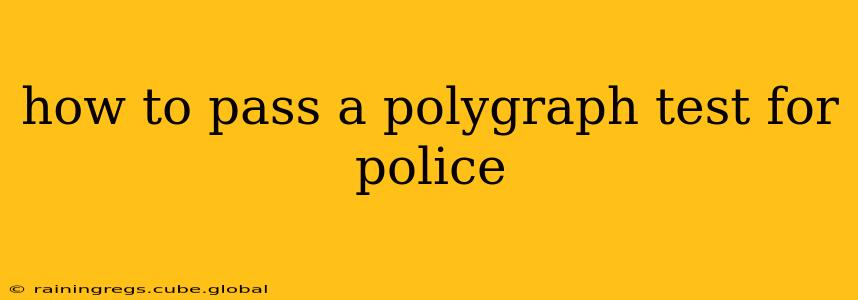Passing a polygraph test, often referred to as a lie detector test, is crucial for aspiring police officers. While the polygraph isn't foolproof and its admissibility in court varies, agencies still widely use it as a screening tool. This guide delves into the process, common questions, and strategies to increase your chances of success. Remember, this information is for educational purposes; attempting to deceive a polygraph examiner is unethical and could have serious consequences.
What is a Polygraph Test for Police Applicants?
Law enforcement agencies use polygraph tests to assess the honesty and integrity of applicants. The exam evaluates your responses to a series of questions related to your background, criminal history, drug use, and suitability for law enforcement. The process involves sensors attached to your body measuring physiological changes like heart rate, blood pressure, respiration, and skin conductivity while you answer questions. Examiners interpret these changes to determine if you're being truthful.
What Questions are Commonly Asked in Police Polygraph Tests?
Polygraph questions for police applicants generally fall into several categories:
- Background Questions: These focus on your personal history, education, employment, and relationships. Expect questions about past addresses, employment gaps, and any significant life events.
- Criminal History Questions: You'll be asked about any past criminal involvement, including arrests, charges, convictions, and involvement in any illegal activities.
- Drug Use Questions: Expect detailed questions regarding your past and present drug and alcohol use, including specific substances, frequency, and quantity.
- Honesty and Integrity Questions: These assess your character and moral compass. They might probe your willingness to follow the law, your ability to handle stressful situations ethically, and your commitment to upholding the integrity of law enforcement.
- Control Questions: These are questions designed to establish a baseline for your physiological responses. They are generally less relevant to the specific issues under investigation but help the examiner gauge your overall reactivity.
How to Prepare for a Police Polygraph Test?
Preparation is key to performing well in a polygraph test. Here's how you can improve your chances:
- Tell the Truth: The most effective strategy is to be completely truthful. Any attempt to deceive the examiner is likely to be detected.
- Understand the Questions: Before the test, carefully consider the types of questions you might be asked and formulate honest answers.
- Practice Relaxation Techniques: Nerves can significantly affect the results. Practice relaxation techniques like deep breathing, meditation, or mindfulness exercises to reduce anxiety.
- Get Adequate Sleep: Being well-rested can significantly improve your mental clarity and reduce stress levels.
- Dress Comfortably: Wear comfortable clothing that doesn't restrict your movement.
- Ask Questions: Don't hesitate to ask the examiner any questions you may have before or during the test. Clarifying uncertainties can reduce anxiety and improve your responses.
- Be Respectful and Cooperative: Maintain a respectful and cooperative attitude throughout the process. This can help build rapport with the examiner.
Are There Techniques to Beat a Polygraph Test?
While various techniques are purported to help beat a polygraph test (such as biting your tongue or controlling your breathing), these methods are unreliable and risky. Attempting to manipulate the results could be viewed as dishonesty, potentially jeopardizing your application. Focus instead on being truthful and preparing mentally and physically.
Is the Polygraph Test the Only Determining Factor?
The polygraph test is just one component of the overall background investigation. Law enforcement agencies consider various factors, including your application, interview performance, background checks, and references. A questionable polygraph result might not automatically disqualify you, but it will likely increase scrutiny during the rest of the process.
Can I Refuse a Polygraph Test?
Refusing a polygraph test is typically grounds for disqualification. Agencies view a refusal as a lack of cooperation and a potential indication of something to hide.
What Happens After the Polygraph Test?
After the test, the examiner will typically review the results and prepare a report for the agency. The report will be part of your overall application review.
This information serves as a comprehensive guide to understanding the polygraph process and preparing for it. Remember, honesty and thorough preparation are the best strategies for success. Consult with law enforcement professionals for any further questions.
